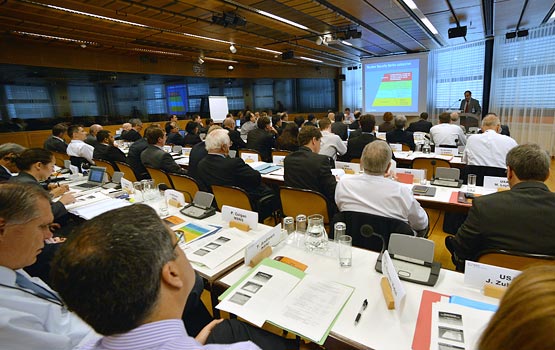|
I enjoy a good laugh...seriously. When former News of the World reporter Neville Thurlbeck described the tabloid press as “a massive force for good”: great comic timing! But not quite the slapstick genius of Newt Gingrich who proclaimed in January that America would have a permanent colony on the Moon by the end of his second Presidential term. As if the Yanks would elect him twice!
So I thoroughly enjoyed the entertainment offered by a recent issue of the industry’s RailStaff newspaper featuring an article about RSSB entitled “What do they do?” I was initially bemused that the pages weren’t left blank; presumably they would have been if the posed question had read “What do they do well?” or “What do they do of value?” Instead we were treated to a stream of banality - no critical analysis, no value-for-money assessment, no measure of quality. Just propaganda.

An RSSB subgroup considers the introduction of low-visibility clothing in an effort to reduce eye strain on sunny days.
Photo: Dean Calma/IAEA
An example was given of how RSSB “helps make sure people don’t spend money unnecessarily”. This related to the Noise Abatement Society’s campaign to prevent train horns from bursting lineside neighbours’ ear drums which the Board claimed would have cost the industry £20 million. Bear in mind this was six years ago - presumably it couldn’t come up with anything of importance it’s done more recently.
Following a hugely protracted and frustrating process, the final report was a fudge - described by Residents Against Train Horns as “a puppet to prevent investment by the Train Operating Companies” and “not going nearly far enough”. The Noise Abatement Society was equally unequivocal: “After five years of inflicting this unassessed shrill train horn on the public and spending hundreds of thousands of pounds on trying to accommodate it within the railway infrastructure, the RSSB has come up with recommendations that virtually change nothing.”
“The suggested massive tinkering with the railway system will compromise safety, put huge pressure on the drivers and still leave a blanket of excessive unnecessary noise pollution throughout the UK. The Noise Abatement Society reiterates that safety is paramount. The report clearly has ignored the source of the problem.” This ancient history - the best RSSB could come up with to demonstrate its worth - fell well short as far as everyone else was concerned.
And that’s a familiar story. The Board strives for adequate and average whilst the rest of the industry is forced to excel. It exists only to dress windows; drowning risk in a bottomless pit of irrelevance as progress and innovation flounders. For its multi-million pound budget, RSSB exclusively outputs words - an easy life compared to that confronting people in operational roles where genuine risk is encountered. But it can’t even do that well. Over-paid minions - and the processes they build around them - are guilty of safety-critical failings in relation to the Rule Book, yet these are tolerated without sanction. Nobody in the safe haven of the committee room is held accountable.
|
| Nobody in the safe haven of the committee room is held accountable. |
|
It’s a different story for those with their feet on the ground. On 6th August, a trackworker sustained serious injuries after being struck by a Nottingham-Worksop train travelling at 55mph on a curved section of single line near Bulwell. The casualty, who was working alone, was inspecting trackside vegetation when the driver saw him standing close to the line. A warning was sounded but the trackworker was struck by one of the train’s steps as it passed.
RAIB - as well as looking into the planning of the work and suitability of the safe system - is also scrutinising the actions of the injured party and will no doubt point a finger at him if he is found to have lapsed in some way. Competences could be suspended, employment prospects threatened. Contrast that with the impunity enjoyed by the office-bound.
On 16th July, a three-man team was involved in structure gauging work on a river bridge near Roydon in Essex - two taking part in the task and the other acting as lookout. As a result of the girders on both sides of the line and their height relative to the track, the nominated position of safety was beyond the end of the bridge. When a Cambridge-London Liverpool Street service came into view at 65mph, the group moved clear but its last member only managed to do so two or three seconds before the train passed.
RAIB’s initial investigations have found that the sighting distance did not provide sufficient time for the workers to reach the position of safety with at least 10 seconds to spare, as the rules demand. So the COSS can expect to have his collar felt when the full inquiry is finalised, whether or not he had the manpower available to appoint a distant lookout.
The industry is persistently guilty of double standards. Those paid inflated salaries to churn out waste paper are immunised against the hindsight-driven regime of blame and castigation inflicted on practitioners. It’s another example of the injustice that disadvantages those fulfilling roles of real social value. We have some prime candidates for your colony, Newt. |